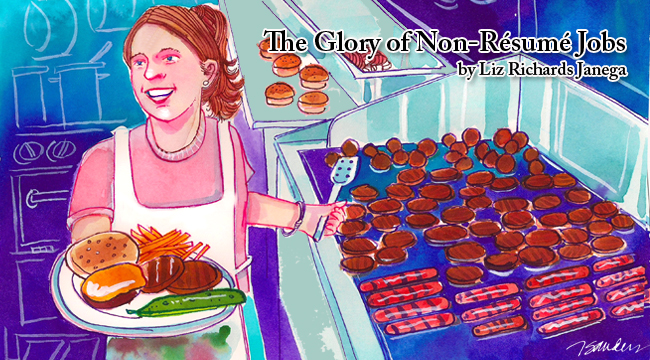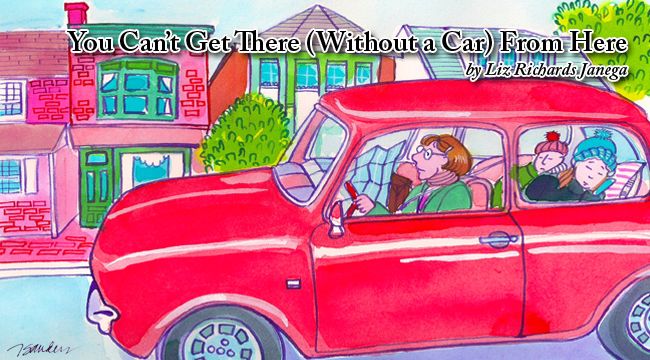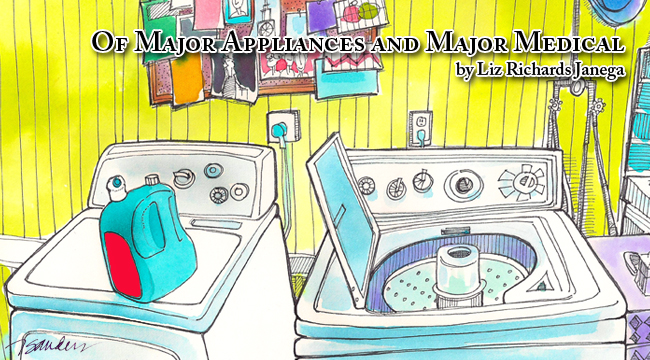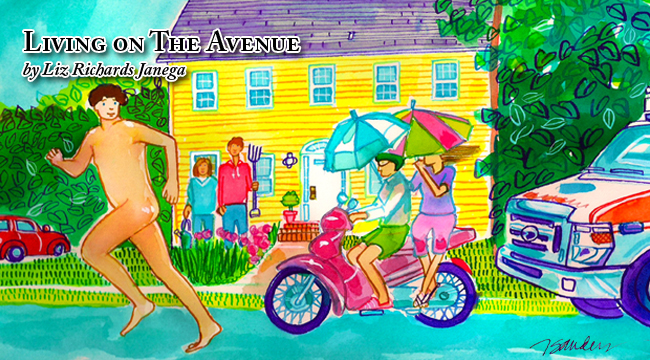 Reading over my résumé recently made me realize how many interesting and unusual jobs never made it to that list simply because they’re not considered “professional” (oh – and also because then my resume would be five pages long). And so, without further delay, to give credit where credit is due, (drum roll) here is a not-so-brief list (WITH AWARDS!) of some of the more salient moments of my pre “professional” so-called career:
Reading over my résumé recently made me realize how many interesting and unusual jobs never made it to that list simply because they’re not considered “professional” (oh – and also because then my resume would be five pages long). And so, without further delay, to give credit where credit is due, (drum roll) here is a not-so-brief list (WITH AWARDS!) of some of the more salient moments of my pre “professional” so-called career:
Most ‘Why on Earth Did They Hire Me?’ Job: Painting and Lawn Mowing Crew, Chevy Chase, Maryland. Job: Not-So-Handy Person: At fourteen, this was the first job I ever had that did not involve babysitting. I didn’t work for those folks for very long. One customer in Chevy Chase questioned my experience as I painted the exterior trim of her house (she was smart to do so – I WAS FOURTEEN). The rest of the crew consisted of men in their 20s and 30s, but they were very respectful, even acquiescing to my vegetarian requests at lunch. I finally quit after we mowed lawns all day at Andrews Air Force Base; by the time I made it back home I was exhausted and wheezing.
Smartest Economic Move By An Employer: Baskin-Robbin’s Ice Cream Shop, Cabin John Shopping Center, Potomac, Maryland. Job: Ice Cream Scooper. New workers were encouraged to eat as much ice cream as they wanted. After any employee’s first week or so, the last thing in the world they wanted was ice cream.
Most Esoteric Job/Most Eccentric Boss: Good Vibes, Garrett Park, Maryland; Owner = Bill Marimba. Job: Mallet Finisher. This micro-company made mallets for marimbas and vibraphones, and was created by Bill “Marimba,” (a name he bestowed on himself – I don’t think he ever had it changed legally). After drilling holes in Super Balls (remember them?!), and inserting rattan handles, Bill would then pass them on to his peon workers (me, for example). Our job was to wrap nylon yarn around the Super Balls in such a way as to create a nice cushiony thickness suitable for use by percussionists. This all took place in Bill Marimba’s falling-down house near the railroad tracks in the Nuclear Free Zone that is Garrett Park, Maryland. Bill was a rabid Wobbly, and a strict vegan, often going on carrot juice fasts that literally turned his skin and his frizzy halo-hair orange. Most memorable quote from him was when some workers left their lunch in the kitchen’s IWW bumper sticker-encrusted refrigerator. Bill discovered the infraction and screamed unhappily, to no one in particular, “Those nerd-brains left a meat sandwich in my refrigerator!”
Most Underpaid (But Nonetheless Cool) Job: Five and Dime in Wildwood Shopping Center, Bethesda, Maryland. Job: Cashier, stock person, key maker. This was the real old-fashioned kind of store that sold everything from thread to notebooks to shoelaces to esoteric candy such as Fizzies and those little candy wax bottles filled with red dye #2 juice. One of my favorite tasks was making keys for customers. However, I was eventually “let go” when I asked why I wasn’t receiving minimum wage.
Most “Sign of the Times” Job: Hecht’s in Montgomery Mall, Bethesda, Maryland. Job: Cashier. I can’t remember what my “Department” was called, but I refer to it as the “Groovy Hippy Department,” because that was where my peers could purchase lava lamps, happy face buttons, happy face T-shirts, happy face trash cans, peace symbol stickers, peace symbol necklaces, peace symbol bumper stickers, black light posters, and, of course, beaded curtains. I’m not sure how long that department lasted in that incarnation, but if it still existed when I graduated from high school, it would have been the go-to place for a Pet Rock.
Most Ironic Job/Best Boss: E.J. Korvette’s Snack Shop, Rockville Pike, Rockville, Maryland. Job: Short Order Cook/Server. Ironic, because I was a vegetarian, and this was a very busy and extremely meat-oriented snack shop that served burgers, hot dogs, fries, half smokes (you get the picture). I really enjoyed it though; it was always packed with customers, and I was in constant motion – putting in a batch of fries, flipping a burger or a half smoke, slicing turkey, assembling a sandwich, or waiting on a customer. Never a dull moment. For some reason my boss, who was great and taught me a lot, nicknamed me “Libby” on my first day, and I never corrected her.
Best Training, Best Employee Camaraderie: The Magic Pan, Montgomery Mall, Bethesda, Maryland. Job: Crepe Assembler. Before ever entering the kitchen, all new hires had a very involved video instruction and discussion session. This was followed by hands-on training in the kitchen, where we learned to create delicious Coquilles St. Jacques Crepes, and the out-of-this-world Banana Crepes Chantilly. Perhaps because of the terrific training, there was genuine camaraderie in the kitchen.
Most “Rosie the Riveter” Type Job: Sears, Montgomery Mall, Bethesda, Maryland. Job: Tire Changer. Between backpacking in Europe after high school (I know – cliché – sorry!) and going to college (that was back when you could apply to the University of Maryland/College Park, say, in April, and get in), I went to the Human Resources Department at Sears and filled out an application. The human resources woman sized me up (not in an inappropriate way – I’m sure she was just trying to figure out how heavy a tire I could lift), and then asked me if I would consider training to become Sears’ first female tire changer (this was the mid-seventies, and equal opportunity was on the front burner). “Sure,” I said, “Why not?” And so it was that I learned how to bust a tire, use very loud equipment, and talk like a sailor (OK, I already knew how to do that!) My uniform was the same as the guys’ – grey cotton pants and shirt with Sears logo – and my long hair was pulled back in a ponytail. Nonetheless, a customer (yes, she was an old lady), once referred to me as “young man.” I learned how to put a car on a lift, pop off the hub caps, remove the lug nuts from the wheels with a torque wrench (ruining my hearing in the process – BRRRRMMMMM). Then it was over to the machine that would assist me in removing the tires from the rims. After putting on the new tires and filling them with the appropriate amount of air, I would hammer in lead weights, where needed, to balance them and then put the tires on the car. All of this was accomplished using a machine capable of decapitating someone, I was warned. Some of the old-timers never got used to “a girl” being in the shop, but I suppose I did a good enough job, because my boss wanted to send me to train to become a Front End Mechanic. Like an idiot, I declined his offer, and went to college instead, getting a useless degree in English.
Least Training, Most Pompous Overling: Bloomingdales, White Flint Mall, Bethesda, Maryland. Job: Gift Wrapper. My start date was right around Christmas, so naturally, without any training whatsoever, I was thrown front and center, alone, on the wrap desk. In front of me were at least a dozen customers waiting with items to be gift-wrapped. There were “examples” of wrapped packages tacked up on the wall behind me, but as a rule no one ever wanted the super fancy “example” ones, because you had to pay for them. Mostly everybody just wanted the free Bloomingdale’s wrapping paper, especially if they were buying fifteen $2 dollar items that they wanted to have wrapped individually. Perhaps this generosity towards its customers lead to Bloomingdale’s later financial difficulties, but they weathered it apparently – I just drove by it the other day! One time I was in the fine china shipping department getting a large order of wedding registry gifts ready to be shipped. In swooped a large man in a three-piece-suit, and barked that he needed to take my only heavy-duty tape dispenser; I protested, motioning to all of the china and crystal ware that needed to be bubble-wrapped and boxed up for shipping, at which point he bellowed, “Do you have any idea who I am?” (I did not.) Then he told me: “I am the Vice President of the ENTIRE STORE!” “Well,” I said, “Then I guess you can have the tape.”
Most “I Don’t Want To Belong To Any Club That Will Accept People Like Me as a Member” (quote courtesy of Groucho Marx) Job: University of Maryland, College Park Food Co-op. Job: Sandwich Preparer/Cashier/Fraud. The food co-op was in the basement of the Student Union, and was (and still is, I believe) “worker-owned.” It took me two tries at one of the very serious quasi-Marxist meetings before I was “allowed” to become a volunteer at the co-op, which would not provide me with any money, but would give me a food credit. The collective’s reluctance to let me join their group was probably because they realized I had a complete lack of interest in politics – all I really wanted was daily access to the four-inch thick sandwiches on whole grain wheat stuffed with Havarti cheese, lettuce, bean sprouts, carrots, cucumbers, and yes, mayonnaise. I didn’t mind working there, but I kind of felt like an imposter, particularly on that day in the late 70’s when we went as a group to “bury student apathy” in the giant “M” garden on Route One. Amazingly, the administration let us attempt to dig a hole in the garden and bury an empty casket. The FBI probably has a file on me because of my association with the food co-op.
Most Blatant Sexual Harassment: Casual Gourmet Restaurant, Pooks Hill, Bethesda. Job: Waitress. My shift was the non-lucrative breakfast and lunch crowd. My boss never called me by my name; instead, he referred to me as “Big Blonde Girl.” The day he crept up behind me and pressed himself into me, whispering how lonely he was because his wife was out of town, was the day I quit.
Most Nicotine Residue: Mr. Henry’s Restaurant, Washington, D.C. Job: Waitress. Once again I had a shift with lousy tips – after lunch but before Happy Hour. In between serving customers, there was a lot of free time. One of my tasks was to clean all of the glass surfaces of the yellow nicotine residue that was a byproduct of the copious cigarette smoking that was allowed back then. I have never been a smoker, but if I had been, handling Windex-soaked and nicotine stained rags several times a week would surely have made me quit.
Hottest (as in temperature) and Most Boring Job: Screenprinting Shop, College Park. Job: T-Shirt Sorter. The THOUSANDS of T-shirts waiting to be “screened” (now THAT was a job that looked like fun), were stacked ten to fifteen feet high, in no particular order as to size, color or condition (along with picking for size and color, I had to weed out any shirts that had holes in them). This all took place in an un-air-conditioned shack.
Coolest (as in most awesome) Job Ever, Ever, Ever: George Romero films, shot in Pittsburgh, Pennsylvania – Dawn of the Dead (1978) and Knightriders (1981). Job: Extra. Pay – $25 a day and all you could eat at the craft service table. Fun, fun, fun. My oldest sister Susan was friends with George Romero and Tom Savini, the Special Effects guy on Dawn of the Dead. Being an excellent older sister, she not only landed me a part as a Zombie, (fine! All the extras were Zombies!), but she ALSO finagled me the opportunity to be rigged up with a squib blood pack (actually a condom filled with fake blood), so that I could be shot and not die in one scene, because I WAS THE UNDEAD. Our seventy-year-old father was also a Zombie in Dawn of the Dead (if my mother had still been alive, I like to think she would have been one as well . . .) On the drive home from the shoot, my dad and I got caught in a snowstorm and had to seek lodging for the night – we checked in wearing full Zombie pancake grey make-up. BECAUSE WE WERE THE UNDEAD.
Not long after my brief shot at movie stardom (all of my clips ended up on the cutting room floor, I’m quite sure), I graduated from college with a BA in English, and it was time to get a “real” job. When I graduated, the U.S. was in a severe recession, and unemployment was higher than it had been since the Great Depression. This meant that many, many people were vying for not enough jobs. (Sound familiar?)
My favorite post-college job interview was in Georgetown, Washington, D.C. at the Yes! Health Food Store/cafe. They were looking for someone with a college degree to design and write a newsletter for them. No problem! Then they told me the pay: Minimum wage. “Really?” I asked, stunned, and wondering aloud why I went to college, and how someone could support themselves on little more than three dollars an hour. My interviewer said that many of the workers lived in group houses, and that the job had “psychic benefits.” Psychic benefits!! I left his office and told the other college grads waiting to interview for the job what the salary was. Then I left the building, drove my brother Rusty’s rusty orange Datsun back to my father’s house, and wondered what the future would hold.






